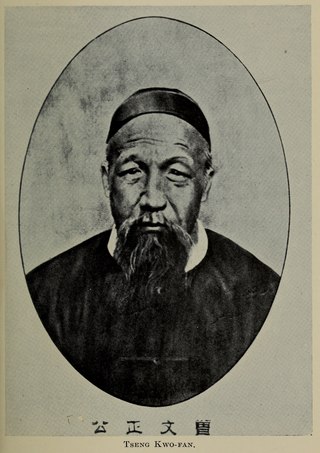| |||||
| Decades: | |||||
|---|---|---|---|---|---|
| See also: | Other events of 1869 History of China • Timeline • Years | ||||
Events from the year 1869 in China.
| |||||
| Decades: | |||||
|---|---|---|---|---|---|
| See also: | Other events of 1869 History of China • Timeline • Years | ||||
Events from the year 1869 in China.

Empress Dowager Cixi ; born Yehe Nara Xingzhen, was a Chinese noblewoman of the Manchu Yehe Nara clan, concubine and later regent who effectively controlled the Chinese government in the late Qing dynasty for almost 50 years, from 1861 until her death in 1908. Selected as a concubine of the Xianfeng Emperor in her adolescence, she gave birth to a son, Zaichun, in 1856. After the Xianfeng Emperor's death in 1861, the young boy became the Tongzhi Emperor, and she assumed the role of co-empress dowager, alongside the Emperor's widow, Empress Dowager Ci'an. Cixi ousted a group of regents appointed by the late emperor and assumed the regency along with Ci'an, who later died. Cixi then consolidated control over the dynasty when she installed her nephew as the Guangxu Emperor at the death of her son, the Tongzhi Emperor, in 1875. This was contrary to the traditional rules of succession of the Qing dynasty that had ruled China since 1644.

The Tongzhi Emperor, temple name Emperor Muzong of Qing, born Aisin-Gioro Zaichun, was the ninth Emperor of the Qing dynasty, and the eighth Qing emperor to rule over China proper. His reign, from 1861 to 1875, which effectively lasted through his adolescence, was largely overshadowed by the rule of his mother, Empress Dowager Cixi. Although he had little influence over state affairs, the events of his reign gave rise to what historians call the "Tongzhi Restoration", an unsuccessful modernization program.

Zeng Guofan, Marquis Yiyong, birth name Zeng Zicheng, courtesy name Bohan, was a Chinese statesman and military general of the late Qing dynasty. He is best known for raising and organizing the Xiang Army to aid the Qing military in suppressing the Taiping Rebellion and restoring the stability of the Qing Empire. Along with other prominent figures such as Zuo Zongtang and Li Hongzhang of his time, Zeng set the scene for the Tongzhi Restoration, an attempt to arrest the decline of the Qing dynasty. Zeng was known for his strategic perception, administrative skill and noble personality on Confucian practice, but also for his ruthlessness in repressing rebellions.
The Tongzhi Restoration was an attempt to arrest the dynastic decline of the Qing dynasty by restoring the traditional order. The harsh realities of the Opium War, the unequal treaties, and the mid-century mass uprisings of the Taiping Rebellion caused Qing officials to recognize the need to strengthen China. The Tongzhi Restoration was named for the Tongzhi Emperor, and was engineered by the young emperor's mother, the Empress Dowager Cixi (1835–1908). The restoration, however, which applied "practical knowledge" while reaffirming the old mentality, was not a genuine program of modernization. Academics are divided as to whether the Tongzhi Restoration arrested the dynastic decline or merely delayed its inevitable occurrence.

Tongzhi porcelain is Chinese porcelain from the reign of the Qing dynasty Tongzhi Emperor (1862–1874), which saw the reconstruction of the Jingdezhen official kilns after the Taiping Rebellion of the 1850s completely devastated the cities of Nanjing and Jingdezhen.
Ma Xinyi was an eminent Hui Muslim official and a military general of the late Qing Dynasty in China.
Mary Clabaugh Wright was an American historian and sinologist who specialized in the study of late Qing dynasty and early twentieth century China. She was the first woman to gain tenure in the Faculty of Arts and Sciences at Yale University, and subsequently the first woman to be appointed a full professor in the Faculty of Arts and Sciences at Yale.
Events from the year 1872 in China.
Events from the year 1861 in China.
Events from the year 1868 in China.
Events from the year 1862 in China.
Events from the year 1863 in China.
Events from the year 1864 in China.
Events from the year 1865 in China.
Events from the year 1866 in China.
Events from the year 1867 in China.
Events from the year 1870 in China.
Events from the year 1871 in China.
Events from the year 1873 in China.
Events from the year 1874 in China.